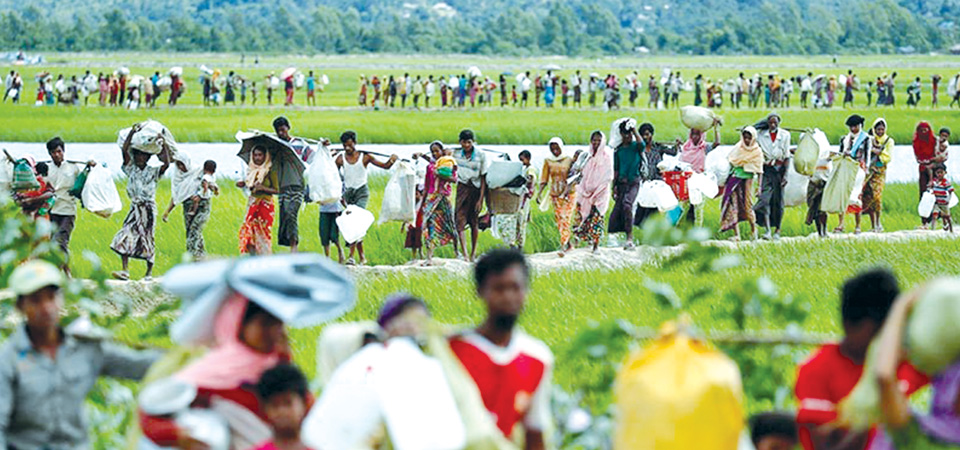Rohingya refugees continue to enter Nepal illegally

By A Staff Reporter
Kathmandu, Sept. 17: Nepal Police have said that some Stateless Rohingyas have been found entering Nepal via Kakarbhitta border in eastern Nepal for the past few days.
The incident came to light after 14 Rohingya refugees, including some children, were found to have entered Nepal and got apprehended when they arrived in Kathmandu on September 12.
According to the Metropolitan Police Circle Bouddha, they entered Nepal from the Rohingya refugee camp of Bangladesh via India through Kakarbhitta. After entering Nepal, they arrived at the Rohingya refugee camp, Baluwakhani in Kapan of Kathmandu.
Police claimed that they have been found entering Nepal with the help of Rohingya refugee agents.
According to Deputy Superintendent of Police (DSP) Dhundi Raj Neupane, the head of the Bouddha Metropolitan Police Circle, a man named Nura Amin has been arrested on suspicion of helping them enter Nepal. He has been in police custody for the past three days.
‘They have entered Nepal via Kakarbhitta through Bangladesh and India. Among the Rohingya refugees entering Nepal illegally are people with small children,’ DSP Neupane told The Rising Nepal. ‘We took them under control on September 12,’ he said.
Police sources said agents from Rohingya community having communication with Amin’s group had been collecting Rs. 250,000 per person to bring them to Nepal.
Chief of the Kathmandu Metropolitan Police Range, SSP Ashok Singh, said that the individuals who entered Nepal illegally have been handed over to the Department of Immigration.
“Rohingya refugees have been found to have entered Nepal illegally, so we have taken them under control and handed them over to the Immigration as per the rule on Monday for further action,” said SSP Singh.
Chief and Director General for Department of Immigration Narayan Prasad Bhattarai said that no specific decision has been taken yet from the Immigration as the Ministry of Home Affairs is still under investigation and further communication and verification of the case.
“Whether they will be taken to the camp in Kathmandu or would be repatriated to Bangladesh, no decision has been taken yet,” Bhattarai said.
Meanwhile, Joint Secretary and Spokesperson for the Ministry of Home Affairs, Phadindra Mani Pokhrel, said that the Immigration Department has been instructed to take one specific decision in coordination with the Office of the United Nations Commissioner for Refugees (UNHCR), Kathmandu.
“So far, we have received information that they have entered Nepal after applying for the refugee status here in Kathmandu. But, from where and which country they applied is yet to be confirmed,” Pokhrel said. Most probably, the UNHCR may provide these details to the government.
Rohingya Muslims displaced from Myanmar have been coming to Kapan in Kathmandu, Nepal from Bangladesh and India and have been living as refugees for nearly a decade.
The government has said that there are 77 families in two camps at Ramtar and Laxmannagar. Of the 355 family members, 86 are children.
The number of refugees of this community in Nepal has been increasing recently. Initially, around 100 Rohingya refugees had entered Nepal. However, since then their numbers have continued to rise.
Experts say that giving shelter in this way will make Nepal a safe haven for refugees. Former AIG of Nepal Police Rajendra Singh Bhandari warned that it will affect Nepal’s social, economic and security sectors if they are allowed to stay in Nepal for long years. “The latest incident of their entry has further established the fact that Rohingya refugees are entering Nepal secretly,” he said.
Rohingyas have been receiving food aid from the UNHCR.
They claim to be indigenous Muslims residing at Rakhine State, Myanmar. In Myanmar, they are agitating for legal recognition as citizens, identity cards and the right to vote. However, the government there refuses to recognize the Rohingyas as its citizens, considering them to be infiltrators from Bangladesh.
Therefore, when they were oppressed in Myanmar, they started entering Bangladesh and Nepal illegally.
Recent News

Do not make expressions casting dout on election: EC
14 Apr, 2022
CM Bhatta says may New Year 2079 BS inspire positive thinking
14 Apr, 2022
Three new cases, 44 recoveries in 24 hours
14 Apr, 2022
689 climbers of 84 teams so far acquire permits for climbing various peaks this spring season
14 Apr, 2022
How the rising cost of living crisis is impacting Nepal
14 Apr, 2022
US military confirms an interstellar meteor collided with Earth
14 Apr, 2022
Valneva Covid vaccine approved for use in UK
14 Apr, 2022
Chair Prachanda highlights need of unity among Maoist, Communist forces
14 Apr, 2022
Ranbir Kapoor and Alia Bhatt: Bollywood toasts star couple on wedding
14 Apr, 2022
President Bhandari confers decorations (Photo Feature)
14 Apr, 2022










